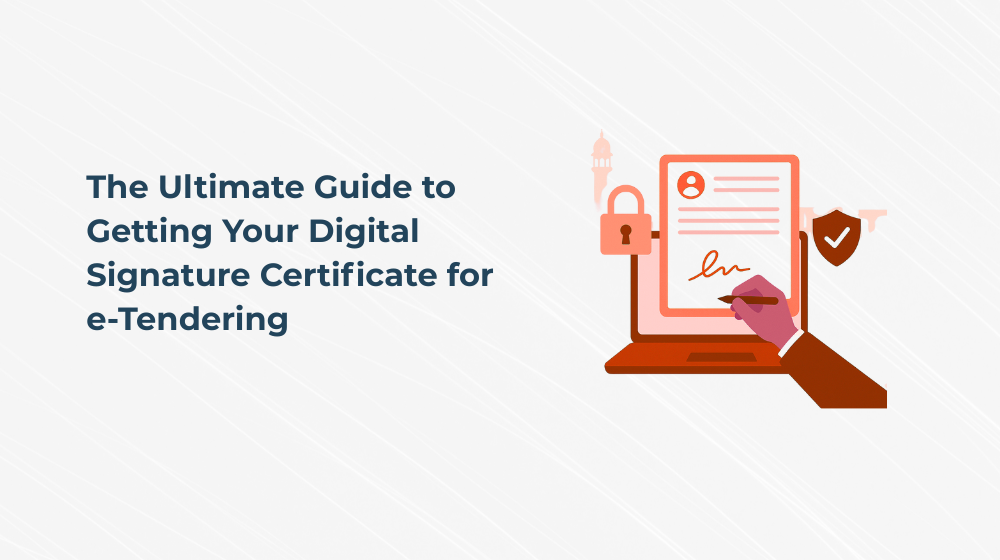In the bustling economic landscape of Gujarat, and particularly in a dynamic business hub like Ahmedabad, staying ahead of the competition is crucial. As government and private sectors increasingly move towards transparent and efficient online procurement, e-tendering has become the new standard. But how do you participate? How do you ensure your bids are secure, authentic, and legally binding? The key lies in a powerful tool: the digital signature certificate (DSC).
If you’re a contractor, supplier, or business owner in Ahmedabad looking to tap into the lucrative world of online tenders, this guide is for you. We’ll break down everything you need to know about getting a digital signature certificate, with a special focus on its critical role in e-tendering. With over 16 years of dedicated experience as Astha Infosoft LLP (formerly DSC Gujarat), we at Digital Signature Certificate House are here to demystify the process and empower your business to thrive.
What Exactly is a Digital Signature Certificate?
Before we dive into the complexities of e-tendering, let’s start with the basics.
A digital signature certificate (DSC) is the electronic equivalent of a physical or handwritten signature. It serves as a secure digital identity for an individual or an organization. Issued by a licensed Certifying Authority (CA), a DSC is typically stored in a secure USB token and contains your verified identity information, including your name, public key, email address, the expiry date of the certificate, and the name of the CA that issued it.
Its primary functions are threefold:
- Authentication: It proves your identity in the digital world, much like a passport or driver’s license does in the physical world.
- Data Integrity: It ensures that the information in an electronic document has not been altered or tampered with in transit.
- Non-Repudiation: It prevents the signer from later denying that they signed the document, making electronic contracts and bids legally enforceable under the Information Technology Act, 2000.
The Different Classes of Digital Signature Certificates
Digital signature certificates are categorized into different classes based on their level of security and the verification process involved.
- Class 1 Certificate: This class provides a basic level of assurance and is used for securing email communications. It’s primarily for individuals and is not suitable for business or legal purposes.
- Class 2 Certificate: Previously, Class 2 certificates were widely used for filing documents with the Ministry of Corporate Affairs (MCA) and the Income Tax Department. However, as of January 1, 2021, Certifying Authorities no longer issue Class 2 DSCs. This is a critical update to note; any provider still offering them is not compliant with current regulations.
- Class 3 Certificate: This is now the most secure and universally accepted class of certificate. It is issued only after a rigorous identity verification process, which may involve in-person or video verification. For any high-security transaction, a Class 3 DSC is the mandatory standard.
Why is Class 3 the Only Digital Signature Certificate for e-Tendering?
When you participate in e-tendering, you are dealing with sensitive commercial data and legally binding financial bids. The procurement portals, whether government or private, demand the highest level of security to ensure a fair and transparent process.
This is where the Class 3 Digital Signature Certificate becomes non-negotiable.
A Class 3 DSC is essential for e-tendering because it:
- Guarantees the Highest Level of Trust: Its stringent verification process ensures that the person or organization placing the bid is exactly who they claim to be.
- Provides Robust Encryption: It comes with both a signing and an encryption certificate. You use the signing key to sign your bid documents, and the encryption key ensures that sensitive financial information is kept confidential until the official bid opening.
- Meets All Legal and Portal Requirements: Government e-procurement portals across India, including those used in Gujarat, explicitly mandate the use of a Class 3 DSC for all bidding activities.
If you’re looking for a class 3 digital signature certificate for e-tendering price, remember that you are investing in the security and eligibility of your business to compete for valuable contracts.
Who Issues a Digital Signature Certificate?
A DSC is issued by a Certifying Authority (CA). These are entities that have been granted a license by the Controller of Certifying Authorities (CCA), a government body appointed under the IT Act, 2000. The CCA sets the standards and regulations that all CAs must follow.
Companies like Digital Signature House (Astha Infosoft LLP) act as trusted service providers, partnering with licensed CAs to manage the verification process and deliver the DSC to the end-user, ensuring a smooth and compliant experience.
Who Can Use a Digital Signature?
The application of DSCs is vast and caters to various users:
- Individuals: For filing income tax returns, signing digital documents, and other personal verification needs.
- Organizations: Essential for company registrations (MCA/ROC filings), GST returns, PF filings, and, of course, e-tendering.
- Government Officials: To authenticate and securely issue government documents and approvals.
- Legal & Finance Professionals: Chartered Accountants, Company Secretaries, and lawyers use DSCs daily to file forms and documents on behalf of their clients.
- Importers & Exporters: A specific DGFT digital signature is required for transactions on the Directorate General of Foreign Trade portal.
Finding the Best Digital Signature Certificate Provider in Ahmedabad
A quick search for a digital signature certificate provider in Ahmedabad will yield many results. But how do you choose the right one? Look for these key factors:
- Experience and Trust: How long have they been in the business? Are they compliant with CCA guidelines? Astha Infosoft LLP brings 16+ years of experience to the table, building a legacy of trust since our days as DSC Gujarat.
- Comprehensive Support: Does the provider offer support during the application and after-sales? A good provider will help you with installation and usage on various portals.
- Clear Pricing: The DSC price should be transparent. The cost of a digital signature certificate depends on its class (Class 3 is the standard), validity (1, 2, or 3 years), and whether it’s a new issuance (with a token) or a renewal. Be sure to ask about dsc renewal fees upfront.
- Range of Services: A provider that offers DSCs for all purposes (Income Tax, MCA, GST, PF, DGFT, E-Tendering) is a one-stop-shop for all your business needs.
Conclusion: Secure Your Digital Future Today
In today’s digital-first world, a digital signature certificate is no longer an option—it’s a necessity. It is your key to participating in high-value e-tenders, ensuring your statutory compliances are met securely, and establishing a trusted identity for your business online.
Don’t let a missing DSC be the barrier between you and your next big business opportunity.



Heard good things about 188betthethao so giving it a shot. Pretty easy to navigate the site. Let’s see if I can score some wins!
Been using Dafbat for a bit now, and it’s pretty solid! The interface is clean, and it’s easy to navigate. Definitely makes placing bets a breeze. Give it a whirl: dafbat
Alright, peeps! If you’re into Free Fire and wanna spice things up with some bets, freefirebetting might just be your jam. Just remember to play it cool and responsible, yeah?
GoldBet888Casino, eh? Sounds fancy! If you’re feeling lucky, give it a whirl. Just don’t go chasing losses, alright? It’s all about having fun, not emptying your wallet. Take a look at goldbet888casino.
Just tried 777maxwin and the slots are fire! Definitely gonna be back for more spins. Check it out 777maxwin
Bongdalus is my go-to for football news and updates. Keeps me in the loop on everything. bongdalus
Hey, checked out fun88vn-sport the other day. Not bad! Found some decent odds and the interface was pretty smooth. Definitely worth a look if you’re into sports betting. Check it out here: fun88vn-sport